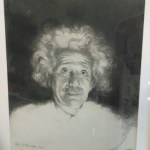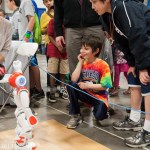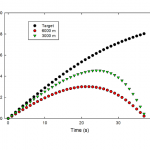Science
The 3rd USA Science & Engineering Festival, the nation's largest celebration of STEM, is just one month away! This FREE and open to the public event will take place April 26 & 27 at the Washington, D.C. Convention Center. Over 250,000 attendees will experience the weekend of a lifetime with 3,000 hands on exhibits, 150 stage shows, including presentations from science celebrities Bill Nye and Michio Kaku, teacher development workshops, a Festival Book Fair and much much more!
Here is just a sampling of the upcoming stage shows at the Festival Expo Finale:
Learn From Mike Rowe of…
So, there was this big story in cosmology the other day-- Tom Levenson's write-up is very nice-- which has been hailed as one of the greatest discoveries since the last greatest discovery, blah, blah, blah. And now that a few days have passed, we're starting to see the inevitable backlash, ranging from detailed technical analyses of possible other explanations to more general musings about the nature of peer review. I'm not qualified to evaluate the former, so I'm going to talk a bit about the latter.
The title of that Atlantic post is "'One of the Greatest Discoveries in the History of…
When it comes to wowing young learners with a wide array of exciting hands-on experiences in science, technology, engineering and mathematics (STEM), the Chevron STEM Zone exhibit ranks among the nation's best! Get ready when the "STEM Zone" lives up to its reputation during its debut at the Festival Expo in April, bringing to visitors a smorgasbord of dynamic, interactive science demonstrations in one 3600 square-foot location.
Chevron, which joins the Festival this year as a major sponsor, has used its STEM Zone with great success as a popular science outreach extravaganza…
"Daddy? How do you make water?"
"You mean, what is it made of?"
"Yeah, what's water made of?"
"Hydrogen and oxygen."
"Oh. And what's hydrogen and oxygen?"
"They're chemical elements."
"So, when we drink water, we're drinking chemicals?"
"Well, yeah. In a sense, everything is chemicals. Water's a chemical, air is made of chemicals. "
"What about, like, wood?"
"Chemicals."
"What?!?! Is everything chemicals?"
"Pretty much, yeah."
"What about lights?"
"Light isn't a chemical, but the things that make light are made out of chemicals."
"Yeah, like, the Sun is fire, and it makes light, but is the…
By Shawn Flaherty
The first ever X-STEM: Extreme STEM Symposium—presented by Northrop Grumman Foundation and MedImmune—kicks-off the 3rd USA Science & Engineering Festival Expo and Book Fair, hosted by founding and presenting sponsor Lockheed Martin. Being held on April 24th at the Walter E. Washington Convention Center in DC, X-STEM is a “TED-style” event for kids with talks by 50 of the nation's most noted science, technology, engineering and mathematics (STEM) professionals representing top universities, corporations, non-profits, and governmental agencies.
“X-STEM is the…
In which Rhett and I chat about the hot new discovery of primordial gravitational waves (maybe) very briefly before segueing into talking about LIGO, and Cosmos, and why "theory" is a terrible word, and the memorization of constants, and standardized tests, and time-lapse videos. You know, as one does.
Miscellaneous items:
-- I'm a little pixellated, as if I'm concealing my identity. I forgot to shut Kate's computer down, so it may have been doing online backups that chewed up bandwidth.
-- The von Neumann quote I butcher at one point is "The sciences do not try to explain, they hardly even…
Imagine you were a very clever ant, living on a large log, floating in a big lake...
BICEP2 at twilight
...a very large, deep, cold lake.
Being a not incurious, clever ant, you contemplate the lake in its infinite and insurmountable vastness.
Surely knowing what lies on the lake, or even beyond the lake (if such can be conceived) is not feasible.
Then, you notice that the lake has ripples.
Ripples, and waves, and swirls.
So, being a methodical sort of ant, you start measuring the ripples and waves and swirls, and you get your student ants to measure them also.
You measure lots of waves,…
This week's Cosmos was all about the evolution of life, and was viewed by millions of people outside of Oklahoma, where they presumably got an hour-long local news promo, or analysis of the Oklahoma State's chances in the NCAA Tournament. As such, it was a bit outside my area of expertise, but that never stopped a blogger before...
There were a couple of things about this that I thought were great, and two things that bothered me. The episode opened with a very nice discussion of the history of dogs and humans, demonstrating how dramatically untold generations of human selection have modified…
I'm sure that a lot of you, like me, are watching the rebooted version of Cosmos: A Spacetime Odyssey, with Neil deGrasse Tyson taking over the hosting duties originally handled so ably over 30 years ago by Carl Sagan. I definitely enjoyed the first episode and am looking forward to additional episodes. The only thing that annoys me is that Cosmos is on at the same time as The Walking Dead, but that's what DVRs were made for. The first episode, which is all I've seen thus far at this writing, was quite impressive, and the segment at the end in which Neil deGrasse Tyson talks about the time he…
The other big nerd event of today is that it's Einstein's birthday, on this date back in 1879. I keep meaning to take and post a photo of the cool picture of Einstein we have in the department's collection of stuff, and this is as good an excuse as any.
Charcoal drawing of Einstein giving a talk in Schenectady in 1939. The original is in the Department of Physics and Astronomy office, donated by Carl George, who I think got it from the artist originally.
If not for him, we wouldn't have anything to sarcastically call smart people who do dumb things. Oh, yeah, and the whole General…
Today is March 14th, 3/14 in the normal American way of writing dates, so you'll find a lot of silliness on the web today talking about "π Day" due to the coincidental similarity with the first three digits of π (see, for example, Rhett's annual post). But, of course, this is an archaic and local convention, and not really suited to the dignity of science.
After all, the defined SI unit of time is the second, so if you're going to do things properly, you really ought to measure time in seconds (like the Qeng Ho in Vernor Vinge's brilliant A Deepness in the Sky). So, a proper celebration of…
By Larry Bock
Co-Founder of USA Science Science & Engineering Festival
No doubt, the influences that move individuals into their chosen field of science, technology, engineering or mathematics (STEM) are often as different as night and day, but one thing seems constant: most STEM professionals, in remembering how they made their selection, can trace that ¨A-ha!¨ moment back to a pivotal experience in their lives that connected them on an emotional level for the first time with their chosen line of work.
That moment for scientist James E. West, inventor of the foil…
"So, that's the science show with space pictures. What did you think of it, honey?"
"Science. Space pictures. Awesome!"
Our umpteenth winter storm of the season delayed school two hours this morning, which is kind of the worst of all possible worlds from a parenting perspective-- when the schools are closed, there's (usually) a snow-day day-care program, but they don't take kids during a mere delay. On the bright side, though, it gave me a chance to show SteelyKid the Cosmos reboot from Sunday night. Her capsule review is at the top.
In a little more detail:
-- I asked her if she wanted to…
So, last week I idly wondered about the canonical falling-bomb whistle. The was originally intended to be a very short post just asking the question, but I got caught up in thinking about it, and it ended up being more substantial. And leaving room for further investigation in the form of, you guessed it, VPython simulations.
This one isn't terribly visual, so you don't get screen shots, just a link to the code at Gist. It's a simulation of a falling bomb, with air resistance, tracking the velocity as a function of time. Then it calculates a "Doppler shift" using the velocity as a fraction of…
I alluded to this on Twitter, and meant to leave that be, but the other thing I was going to blog today didn't come together, and I probably shouldn't leave a cryptic tweet as my only comment. So...
One of the links getting passed around a lot in my social-media circles is this Tumblr post from Ben Lillie on The Humanities of Science Communication, which argues that discussions of the science of communication often seem to ignore the expertise of people who communicate for a living-- playwrights, actors, journalists, etc. This is a good point, but the post as a whole bugged me a bit, because…
I was talking about sex and nothing but sex all last week in genetics, which is far less titillating than it sounds. My focus was entirely on operational genetics, that is, how autosomal inheritance vs inheritance of factors on sex chromosomes differ, and I only hinted at how sex is not inherited as a simple mendelian trait, as we're always tempted to assume, but is actually the product of a whole elaborate chain of epistatic interactions. I'm always tempted in this class to go full-blown rabid developmental geneticist on them and do nothing but talk about interactions between genes, but I…
In which Rhett and I talk about Cosmos. What, you thought there would be another topic? We have contractual obligations, you know...
Okay, there were some other topics like Battlestar Galactica (both versions), why so much of what's on Discovery Channel and TLC sucks these days, the flawed astrophysics of Firefly, speculation about how those little infrared thermometers work, and why some kinds of labs are hard.
And Cosmos again. Because, really, how could we not?
It says here in the fine print that my blogging license could be revoked if I fail to offer a public opinion on the Cosmos reboot, which premiered last night. I missed the first couple of minutes-- I had The Pip for bedtime, and he didn't start snoring until 8:58-- but saw most of it in real time. I posted a bit of commentary on Twitter, but will offer something marginally less ephemeral here.
The show opened and closed with tributes to Carl Sagan, and Neil deGrasse Tyson standing on the same cliff where Sagan opened the original series back in 1980. That was good and fitting, and Tyson's…
Not that long ago, SteelyKid was doing something violent with toys (she's very tough, as you can see from the featured image above), and in the process made the canonical falling-bomb whistle noise. And it occurred to me to wonder, why that sound?
I mean, I've seen footage of falling bombs and the canonical sound seems like an accurate enough. But I'm not sure I understand it from a physics perspective. Specifically, when you do the falling-bomb whistle, you do a whistle that decreases in pitch. But the bomb is falling faster as it approaches the ground, so if anything, I would expect the…
Given the academic circles I run in, it's not surprising that one of the most repeated stories crossing my social media feeds yesterday had to do with the changes to the SAT. Starting in 2015, the essay section will no longer be mandatory, and they're going to reconfigure the reading and math sections to emphasize different categories of questions.
My slightly cynical take on this is that changes seem to be driven more by marketing than education-- stories about this all mention that the changes make the new SAT more like the ACT, which has been gaining in popularity in recent years. Which…









